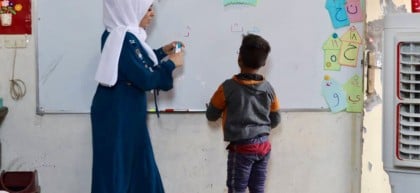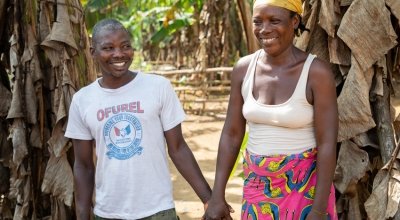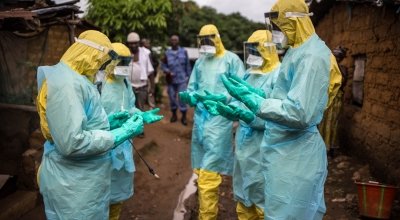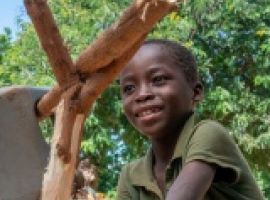
Read our 2022 annual report

Knowledge Hub
A matter of life and death: stories from the Ebola cemeteries
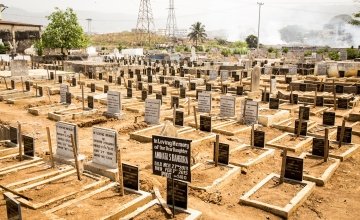
Last month, we ended our work at two graveyards that played a sad but crucial role in Sierra Leone’s fight against Ebola but how can people move on after years of pain?
In February, Kingtom Cemetery in Freetown – which had been run by Concern for 71 weeks – was handed back to the city authorities.
At a small ceremony, wreaths were laid on two of the graves marked only with ‘Known to God’. In the early days of the emergency, the names of many people laid to rest here were lost amid the chaos.
Burials transformed by Ebola outbreak
Kingtom, in the west end of Freetown, is the city’s oldest cemetery. When the crisis hit, it was neglected and left crumbling and overrun with weeds.
As the death toll rose, Sierra Leone’s government decreed that anyone who passed away must get a safe, medical burial. This was due to the fact that the virus often spread to the living from dead bodies. At the height of the crisis, 70 per cent of infections happened this way.
The dead were taken from their homes by trained burial teams wearing full protective gear, put in body bags, and taken to designated cemeteries – including Kingtom.
Fiona McLysaght, who manages Concern’s work in Sierra Leone, says the process was very difficult for local communities.
“There was always an elaborate ceremony here for burials. Then suddenly people’s loved ones were being whisked away by people in plastic suits. It was very hard for them to cope with.”
Distraught families & unmarked graves
In October 2014, Concern and the Red Cross took over the burial system in Freetown. Things had become chaotic: burial workers weren’t being properly paid or equipped and the families were distraught at the way burials were being carried out. Cemeteries struggled to handle the number of bodies, and many graves were not marked or named.
In response, families tried to hide deaths from officials, as they didn’t trust that the bodies of their loved ones would be treated with dignity and respect.
Buried with dignity
Concern’s Sheena McCann, who oversaw the new burial management programme, said that these elements were vital.
“[Kingtom Cemetery] is clean and graves are all arranged in an orderly manner, so that family members can get easy access.”
Concern worked with local pastors and imams, as well as keeping careful records of who was buried where.
A new cemetery, Waterloo, was also created to ease the pressure and now holds 10,040 graves.
In January and February of this year, Concern arranges for buses to help relatives visit the cemeteries. During the outbreak, many were in quarantine or at a treatment centre when their loved ones died. This meant they could not see them laid to rest.
People still ring or visit the cemeteries searching for family and friends. When they arrive, many are surprised and relieved at the good state the graves are in.
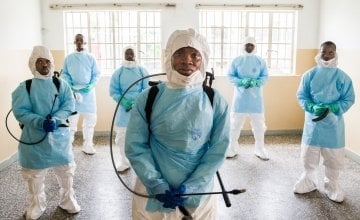
Burial teams shunned
The burial work – safely collecting bodies from homes and laying them to rest – was done by teams of local staff. Many had to deal with abuse and anger from the traumatised families of those who had passed away.
Some team members were shunned in their own communities, over fears they might pass on the virus. A few members of the burial team even wrote a song to raise awareness of the problems they faced.
Eventually, respect for the burial teams grew. Concern organised psychosocial counselling and support during the outbreak, and now we are helping them find new work.
"It is wonderful the outbreak is over but it means many of our teams are out of a job, in a country with no real safety net for people living in poverty. The skills they have learned with Concern should make it a little easier to find work."
Health risks remain
Most of the people buried by Concern in Sierra Leone did not die of Ebola, and about half were children under five. This shocking fact highlights the health risks that families here faced even before the outbreak.
Those dangers are still there but have been made even worse by the scars of the outbreak, so we are committed to working with people in Sierra Leone in the years ahead.
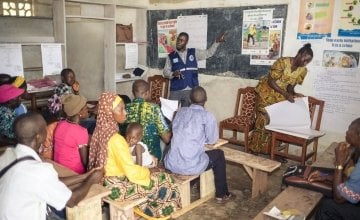
Our work continues
We are giving people the education and skills to escape poverty, improving the health of women and children in ten slum communities and helping people get access to clean water.
We’re also helping people to cope with the effects of climate change and to protect natural resources like forests and wetlands.
A few days after the Kingtom ceremony, Waterloo Cemetery was handed over to the city authorities. Its newest feature was not a grave or a headstone, but a single cotton tree.
The trees are a traditional feature of cemeteries in Sierra Leone. After two years of pain and chaos, this is a sign that things might be returning to normal.
Find out more
Follow the link below to find out more about our work in Sierra Leone.
